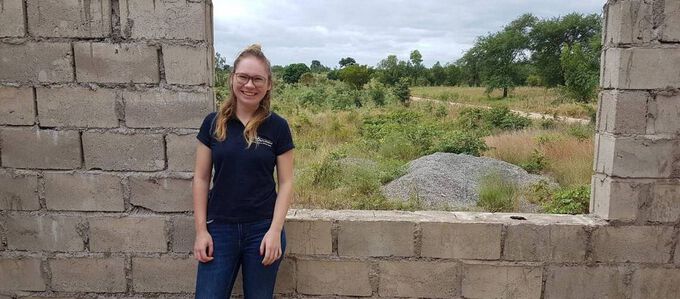
Deep friendships and valuable encounters: these are the memories that Stephanie brought back from Zambia when she returned home to Germany. Anyone can now create such memories. It is not too late yet to apply.
Since 2017, the aid organisations NAK-karitativ and NACRO have been sending young people to Africa to gain intercultural experience. This year young volunteers will be heading to Malawi starting in September. The application deadline is 30 April 2023.
Go global
Stephanie was in Zambia for almost a year. Back in the summer of 2018, once she had completed her bachelor’s degree, she ventured into the unknown. She was 22 years old then. Stephanie had learned about a development volunteer service called weltwärts (which translates into “worldwards”) through the German aid organisation NAK-karitativ. The volunteer service brings young people together from various countries and gets them involved in development work abroad.
With funding from the German government, the young people are sent on assignments and learn about other cultures, learn to show solidarity, and develop their own personality in the process. “Mutual learning is to bring the different ways of life closer together and contribute to achieving the UN Sustainable Development Goals,” it says on the website of nak-karitativ.
Stephanie can confirm that for herself: “Being involved in the projects has allowed me to get to know the country with its many different facets and I am proud that I was able to work there for a year. I was able to learn from people whose lives are very different from mine and I look back on this year with a great deal of gratitude.” The volunteer service gave Stephanie a whole new perspective. After returning to Germany, she began another course of study.
Aid agencies work closely together
NACRO, which stands for New Apostolic Church Relief Organisation, is a charity of the New Apostolic Church Zambia, Malawi, and Zimbabwe. Funding is provided for projects that support smallholder farmers, secure water and sanitation, and provide health and infrastructure support to name only a few.
Currently, NACRO is implementing its first project in Malawi. And that still needs some active assistance. That is why NAK-karitativ, as a partner organisation, would like to send young people to Lilongwe, the capital of Malawi, with the weltwärts volunteer programme of the German government. The application deadline has been extended to 30 April.
Apply now, there is no time to lose
You should be at least 21 years old, already have some professional experience or have completed your studies, write and speak fluent English, enjoy all kinds of work—including office work—be open-minded and a team player, have good communication skills, be familiar with MS Office, and be prepared to take on responsibility. You can still apply.
Before the successful applicants are set for the adventure, though, they will have to hit the books again. In a seminar lasting about two weeks, the volunteers are familiarised with the life and work in the country they will be going to, and learn what to do in the event of challenges they may encounter. They will also look at their own expectations and ideas as to what awaits them as international volunteers and confront racism, stereotypes, colonialism, and their own privileges. And they are introduced to development issues using global learning methods. Once the visa, vaccination, and language issues have been clarified, it is off to Africa in September.
In the office and close to the people
In Lilongwe, volunteers will assist the NACRO team with day-to-day office and clerical work. They will organise training for the target groups, write project applications and reports, and visit the project sites.
The latter was one of Stephanie’s favourite tasks: “I particularly enjoyed gaining insight into the different projects and visiting them within the country,” she says. “As I see it, the programme offers a unique chance to spend a longer period of time in a country you would likely not just travel to otherwise. Africa is rich in culture, tradition, and innovation. Volunteers learn to work in an intercultural team and live in a different society. At the same time, you also start to look at yourself and your own country much more closely and see things in a different light. For a young person this is particularly valuable. In addition, working in an NGO is very varied and exciting.”
Here is Stephanie’s advice to potential applicants: “Above all, you need to be open, unbiased, and curious! Many things are different in the volunteer service and in the country than you might have imagined beforehand. You shouldn’t be afraid to leave your comfort zone and reach out to people, their country, and their culture.”
















